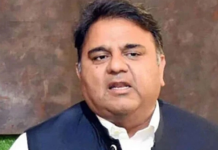From Zeeshan Mirza
KARACHI: Sindh Governor Kamran Tessori and his Punjab and Khyber Pakhtunkhwa (KP) counterparts discussed the current political situation including the seminary bill and Parachinar incident.
According to details, Punjab Governor Sardar Saleem Haider and Governor Khyber Pakhtunkhwa Faisal Karim Kundi called on Kamran Tessori to discuss the country’s current situation, registration of madrasas, and the Parachinar issue.
The governors of Sindh, Punjab and KP emphasised finding a permanent solution to the Para Chinar issue and decided to utilise all resources necessary to achieve the goal. They also agreed to meet with local leaders and jirgas in Parachinar to establish lasting peace.
Kamran Tessori also highlighted the importance of madrasas in Pakistan’s education system, stressing that joint efforts are necessary to improve the sector further.
Governor Tessori appreciated the efforts of the Khyber Pakhtunkhwa governor in maintaining peace in Kurram district. He said that inter-provincial relationships will pave the way for unity and progress.
Punjab Governor Sardar Saleem Haider praised Governor Tessori’s efforts in finding a permanent solution to the Parachinar issue. Meanwhile, Sindh Chief Minister Murad Ali Shah welcomed Punjab Governor Sarwar Salim Hayder and Khyber Pakhtunkhwa Governor Faisal Karim Kundi at the CM House.
Provincial ministers Sharjeel Memon, Saeed Ghani, Jam Khan Shoro, and Jam Ikramullah Dharejo also attended the meeting.
The chief minister and the governors discussed the current political and economic situation in the country. They also talked about the strength of the Pakistan People’s Party (PPP) in Punjab and Khyber Pakhtunkhwa.
The meeting also focused on conveying PPP Chairman Bilawal Bhutto Zardari’s message to the people of Punjab and Khyber Pakhtunkhwa.
Earlier,. Jamiat Ulema-e-Islam (F) Chief Maulana Fazlur Rehman has warned the government of protests over the Seminary bill issue.
Addressing the National Assembly, Maulana Fazlur Rehman stated that presenting the bill again without accepting it as an act would violate the Constitution.
He questioned why a precedent was being set that could jeopardize the entire legislative framework.
“If the matter is not resolved, the decision will be made on the roads rather than the parliament,” warned Fazlur Rehman.
Referring to the President’s role, he said, “If the president does not sign a bill within 10 days, it automatically becomes law, as has already happened in past instances.”
The JUI-F Chief criticized the government’s stance on religious seminaries, saying that madaris have always supported the Constitution and the law. “Why are our madaris being tested repeatedly despite their proven record?” he asked, adding that students of religious schools excel in both traditional and modern education systems.
He further warned the authorities not to attempt dividing religious seminaries or undermining them.





